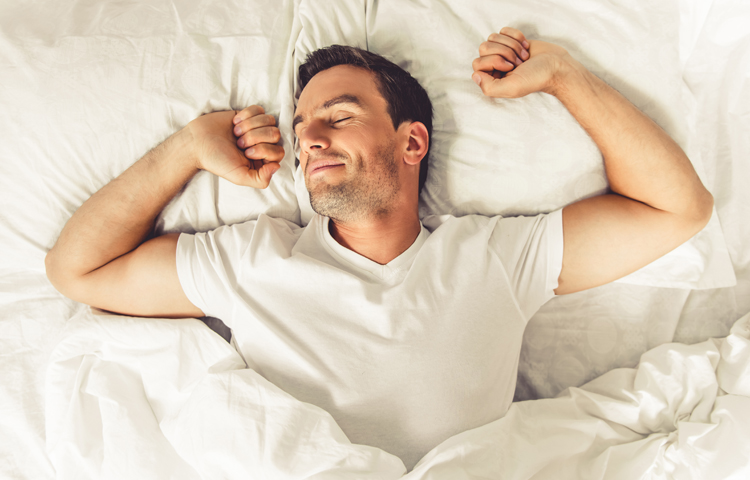
Getting enough shuteye is a common issue for many people, and the older you are the worse it can get.
New research suggests that certain brain mechanisms change as we age, which can then prevent you from getting the right amount of sleep.
The study suggests that, as you age, your brain has more difficulty knowing when you’re actually tired and that by the time you reach 50, you are likely to spend half as much time in a deep sleep than you did 30 years before.
Lack of sleep can cause you to feel groggy, grumpy and unproductive – and seriously impact your running.
Here’s some expert-led advice on how to catch some first-class 40 winks…
1. Carbs are king
Slow-releasing carbohydrates help to keep the levels of sugar (glucose) in your blood stable, and so provide your body with sustained energy.
You may not think you need much energy while you’re asleep, but your brain and body still need glucose to keep working.
“If levels fall too low, this can cause the release of the hormones adrenaline and cortisol, which can wake you up.
“To avoid this, make sure you have some slow-releasing carbohydrates in the evening, such as an oatcake with some hummus,” suggests Dr Marilyn Glenville, the UK’s leading nutritionist and author of the brand new Natural Solutions for Dementia and Alzheimer’s (marilynglenville.com).
2. Sweet potato dreams
“Eating some sweet potato with your evening meal can help keep up that drip-feed of energy over the night, and help with melatonin production.
“Sweet potato can be a better option than a white potato, as it tends to release energy more slowly, while still being a good source of carbohydrates.
“And stick to a moderate portion such as one medium potato, especially if you’re watching your weight,” says nutritionist Cassandra Barns.
3. Sweet tooth secrets
If your sweet tooth is hindering you settling into the mind-set of sleep, try Slissie (from £24.99, slissie.co.uk), which is the first of its kind as it delivers curb-craving flavourings that instantly help you resist the temptation of sugary, calorific snacks.
Once the flavours that contain aromas are detected by your tastebuds and olfactory receptors, messages are sent to the appetite control centres of the brain leaving users feeling their appetite has been satisfied.
At the press of a button you can taste flavours such as, chocolate, vanilla and mint, making your brain think you’ve had that sweet treat without any nasty sugars being involved.
4. Choose cherry juice
“Cherries have been found to contain small amounts of melatonin, the hormone that helps regulate your sleep-wake cycle.
“So if you struggle with insomnia, a glass of cherry juice or a serving of fresh or dried cherries before bedtime can naturally help you drift off,” says Cassandra.
5. Mellow with magnesium
“Include plenty of magnesium-rich foods in your diet. Think: buckwheat, pumpkin and sunflower seeds, fish and seafood, leafy green vegetables such as spinach and kale as well as dried fruits.
Magnesium is known as ‘nature’s tranquiliser’ and is needed to relax our muscles. It is also vital for the function of GABA, a calming neurotransmitter that your brain requires to switch off.
You can also try taking a supplement, such KalmAssure Magnesium Powder by Natures Plus (£24.50, naturesplus.co.uk).
Take it with your evening meal to help your body wind down at the end of the day,” says Cassandra.
6. Pace yourself with protein
“Make sure that you have enough protein during the day. High-protein foods are meats, fish, beans and lentils, seeds and nuts (choose unsalted and raw rather than roasted).
Protein foods provide the amino acid tryptophan, which converts to the hormones serotonin and melatonin, which is needed for good sleep.
However, avoid too much high-protein food in the last few hours before bed as they can be hard to digest – especially red meat and nuts,” explains Shona Wilkinson, nutritionist at SuperfoodUK (superfooduk.com) the online shopping destination for all things health and wellbeing.
7. Curb caffeine
“To encourage better sleep, minimise your caffeine intake after midday and opt for green tea over coffee.
It gives you a gentle energy lift but can also help you feel calmer, which is a great way to wind down into the afternoon,” says Cassandra.
This is thought to be thanks to an amino acid called L-theanine in green tea, which has been found to have a relaxing effect on the mind, reduce anxiety, and help with focus and concentration.
Try Clearspring’s Organic Matcha Shots (£6.25, clearspring.co.uk).






